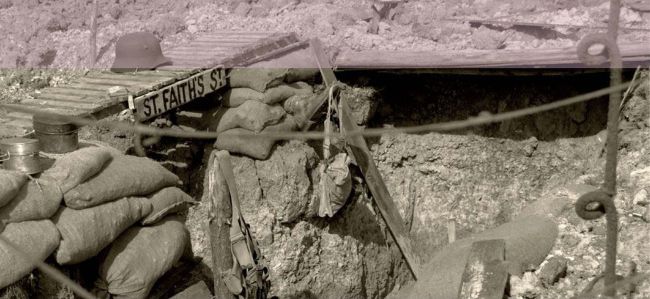In the third part of a series looking at people on the move, the Rev Richard Baxter highlights the importance of journeying with God.
IN the trench warfare of 1914-18, the worst place to be was in No Man’s Land.

Photo: iStock
The gap between the front trenches of opposing armies was the most dangerous of places, and no-one stayed there longer than necessary. In No Man’s Land, it was hard to know if the greatest threat came from the enemy or the people in your own lines.
As we continue our people on the move theme, this month’s focus is on people caught in No Man’s Land. They had come out from one place, but not yet reached another.
Freed from slavery in Egypt, the people of Israel had still to find a home.
For forty years they were in No Man’s Land, wandering in the desert. At first the main threat had been from Pharaoh wanting his runaway slaves back. Later it came less from hostile enemies than from the hardship of the desert itself.
Food and water supplies seemed precarious at best, yet the biggest theat of all was internal. It was the threat of giving up, losing hope, and falling into despair.
Exodus 16 and 17 tell the stories of how, even in the early days, there was a temptation to give in, The memories of slavery faded, and they dreamt of the food available in Egypt. No Man’s Land is an uncomfortable and disturbing place to be. That’s why the people needed the strong reassurance of God’s love and His presence.
They needed to know they were not abandoned.
That came in the pillar of cloud and fire which guided them (Numbers 9:15-23). We can’t easily explain their experience, but it’s clear the people knew God was with them and guiding them. They didn’t know where they were going but (on their good days) they were prepared to trust the one who did.
There is a “No Man’s Land” feeling about the Christian church in Scotland today. We have left behind a past society in which the Christian faith knew where it fitted in the world. Occasionally we look back to the days of full kirks, thriving Sunday schools and ministers in black coats doffing their hats to passers-by, with longing.
But like the Israelites, too often we forget the hardships of the past – the harsh and judgemental attitudes, the lack of opportunity to question and discover, the failure so often to pass on a faith in a way that lasted.
But there is no way back there, any more than the Israelites could have returned to Egypt.
They had to get through No Man’s Land, and the only way to negotiate it was by following God’s lead, even if their destination was not apparent.
The Israelites had a choice. They could follow the pillar of cloud and fire, moving on when it moved on. That way, they journeyed to an unknown destination, but in company with God. The alternative was to get left behind in the desert.
It may not be obvious where God is leading His church in our generation, and we may feel we are in No Man’s Land.
But isn’t it better to follow where He leads, to go where He goes, than to get left behind in the desert?
The Rev Richard Baxter is minister at Fort William: Duncansburgh MacIntosh linked with Kilmonivaig.